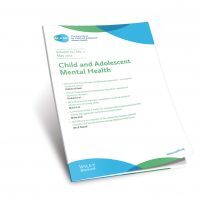Eating disorders
-

Eating Disorders: A Concern for All
Did you know that approximately 22% of children and adolescents worldwide show disordered eating? Eating Disorders Awareness Week (24 February – 2 March 2025) is an opportunity to improve awareness that anyone can have an eating disorder and explore the impact that eating disorders can have on children and young people.
This Eating Disorder Awareness Week, we encourage you to explore the FREE learning opportunities available on our website and ACAMH Learn, and to share with your networks.
Read more -

Brain differences in children who show symptoms of avoidant/restrictive food intake disorder (ARFID)
Magnetic resonance imaging (MRI) scans of children showing symptoms of avoidant/restrictive food intake disorder (ARFID) show differences in certain brain regions relative to children without ARFID symptoms. Findings from this work serve to improve our general understanding of ARFID and may help inform on ARFID-related services or our understanding of ARFID.
Read more -

The Risks and Benefits of Social Media on the Mental Health of Adolescents
This talk will explore the burgeoning use of social media by adolescents in today’s society.
- Event type
- Talk with Q&A
- Location
- LIVE STREAM
-

Dr. Amy McCulloch
Dr Amy McCulloch is a Clinical Research Fellow at the University of Manchester and Galaxy House inpatient unit at the Royal Manchester Children’s Hospital. She is Debates Intern and a committee member for the Northwest branch of ACAMH.
Read more -

Spotlight on Eating Disorders
Eating Disorders Awareness Week (26 February – 3 March 2024) is an opportunity to bring a spotlight on eating disorders and to improve awareness of the impact that eating disorder can have on children and young people.
This Eating Disorder Awareness Week, we encourage you to explore the FREE learning opportunities available on our website, and to share with your networks.
Read more -

An Overview of Psychological Interventions for Avoidant Restrictive Food Intake Disorder (ARFID)
Marking its tenth anniversary as a diagnosis, our scoping review summarised 50 studies reporting on psychological interventions and outcomes for Avoidant Restrictive Food Intake Disorder (ARFID). In the absence of clinical guidelines to support clinicians, our review highlights that a range of psychological interventions can be implemented to support children and young people with ARFID. Here, we summarise the existing literature and highlight areas for further research.
Read more -

Narrative Matters: Wasting away and fed up – dietary battles in history
Paper from the CAMH journal – ‘Histories of anorexia nervosa (AN), mostly written since the 1970s, have a standard narrative. The story is of largely Eurocentric self-starvation in adolescent girls in response to sociocultural pressures on women who are trapped in disempowering patriarchal systems.’ Jane Whittaker
Read more -

Performing well but not appreciating it – A trait feature of anorexia nervosa
Open Access paper from JCPP Advances – ‘We offer a novel behavioral method for measuring perfectionism independent of self-report, and we provide tentative evidence that this behavioral manifestation of perfectionism is evident during first-episode AN and persists even after recovery.’ Tine Schuppli Hjerresen et al.
Read more -

JCPP Editorial: Volume 64, Issue 08, August 2023
Editorial “Developmental considerations in addressing the earlier age of severe eating disorder onset” by Rebecca C. Kamody and Michael H. Bloch
Read more -

Patterns of maladaptive exercise behavior from ages 14–24 in a longitudinal cohort
Open Access paper from the JCPP – ‘The current study clarifies processes that influence exercise-related risk in adolescence and young adulthood, including the frequency with which young people transition between engaging in exercise for weight loss and experiencing negative consequences of this behavior.’ Katherine Schaumberg (pic) et al.
Read more